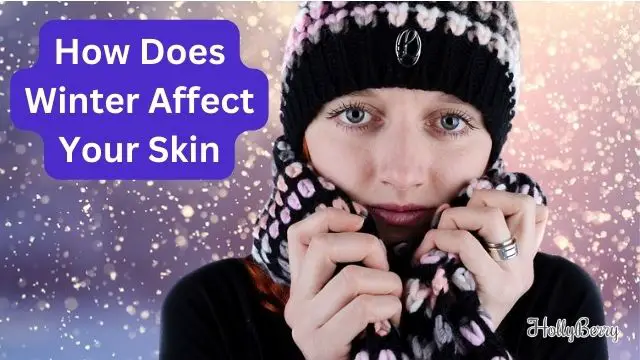
Winter has arrived, bringing along heavy rains, snow, chilly winds, and other extreme weather elements that can harm your skin’s condition and appearance.
And in order to maintain an absolutely beautiful and luminous complexion throughout the entire winter, you need to fight these various adverse effects that the cold weather has on your skin.
This article will guide you through understanding dry winter skin in better detail, along with its roots, effects, and cure.
How your skin changes with the seasons
Whereas hot and sunny weather stimulates your skin to create an excess amount of oil, the winter season seems to have the reverse impact on your skin.
As the humidity levels fall and the temperatures decrease, it is nearly impossible to maintain skin moisture during dry weather conditions even if you layer warm clothes or if you use central heating indoors.
In addition to the visible consequences of winter on the skin, such as dryness, this sudden climatic change itself and the cold winds, along with other various outdoor external factors, may further induce itchiness and swelling.
The condition can even be intensified by brutal cold winds and dry indoor heating, resulting in chapped or even ruptured skin. A person’s diet can change as the season change. Since people tend to consume fewer amounts of water during the winter, it leads to dehydrated, rough, dull, and sensitive skin.
Cold weather and dry skin problems
The skin suffers a lot in low temperatures. The chilly, harsh winter weather is bad for all types of skin, but what if you develop a skin condition or, worse, already have one?
Skin problems like eczema and psoriasis, for instance, can flare significantly during extreme winter conditions. As a result, it’s necessary to be aware of the ways the cold impacts your skin. Following are a few major skin conditions, the various ways in which the cold climate impacts them, and some tips for treating their symptoms more effectively.
Eczema
Eczema also known as Atopic dermatitis is a skin condition that leaves the skin dry, inflamed, and itchy. Though irritating and itchy, it is not infectious. Eczema can be easily controlled, despite the fact that it isn’t curable.
It lingers for a while and can occasionally flare up and spiral out of control. Moreover, flare-ups happen more frequently during this time of the year, triggering severe symptoms caused by sudden climate fluctuations.
So, it is crucial to keep your body temperature under control to help avoid a reaction that could irritate or inflame your skin. Also, set your indoor heating on a low level to enable your body to adjust to the weather naturally.
Chapped Lips
Winter weather dryness often results in chapped lips. Lips have a fairly thin layer of flesh that is prone to tearing when exposed to freezing temperatures, and since the face is regularly exposed to the weather, the lips get chapped.
This can simply be avoided and treated using hydrating lip balms. You can also use lip balms which include calming agents to relieve pain in the affected area.
Acne
The lack of moisture in the atmosphere during winter causes your skin to become dry and irritated, resulting in a deposit of dead skin cells that sometimes clog your pores and cause acne.
Moreover, consuming a lot of high-carb comfort food throughout the winter can disrupt your hormone levels, resulting in skin breakouts and bad skin texture. It can be reduced by avoiding unnecessary skin contact as well as using lotions and cleansers that are mild on the body. However, antibiotic therapy could be beneficial in extremely severe cases.
Psoriasis and cold weather
Psoriasis is a skin condition that creates an accumulation of dead skin cells, resulting in itchy, flaky, rough patches on the skin. Psoriasis can induce small, red lumps to form on various parts of the body, more frequently on the elbows, knees, trunk, and scalp.
The condition could get worse during the winter due to reduced sunlight exposure and dry conditions. This issue, however, can easily be rectified by using a humidifier in your home that helps your skin in absorbing so much extra water. Phototherapy and spending time under the sun can also help with psoriasis flare-ups. Read more about Psoriasis here.
Rosacea and cold weather
Rosacea is a common chronic skin condition that causes the face to swell and turn red over a prolonged time period. It can also cause tiny, pus-filled pimples. Although the origin remains uncertain, extremely dry and cold weather is a significant contributor.
Your skin can get highly sensitive in the winter since it struggles to survive the extreme weather that can make your condition even worse. The best solution is to keep your skin well-hydrated and moisturized while also wearing a scarf to help cover your nose and cheeks.
What skincare routine works the best in the winter?
Since our skin changes with the seasons, so should our skincare routine. Here are a few ways to keep your skin healthy and super soft during the winter:
Cleansing
The first step is to thoroughly cleanse the skin. This should be done with gentle skin cleansers that have mild agents and fewer scents to help maintain the moisture in the body. Avoid cleaning more than once since excessive cleansing strips your body’s natural oils.
Gentle exfoliation
Exfoliation is an essential step since it helps in getting rid of any dead skin cells that may cause acne or breakouts in the future. It also helps in maintaining a soft and smooth skin texture.
Moisturise
Your face demands moisture to maintain its natural glow. After taking a shower, apply generous amounts of moisturizer directly on your damp skin to allow the product to hold moisture on the surface.
Avoid using products that include lanolin or fragrance if you have delicate skin. You can also apply a hydrating serum before your face cream. You can order our pure hyaluronic acid serum here.
Follow these steps, drink plenty of water, and eat a nutritious, well-balanced diet, and you will be ready for the winter. And if your problem doesn’t improve, visit a dermatologist.


